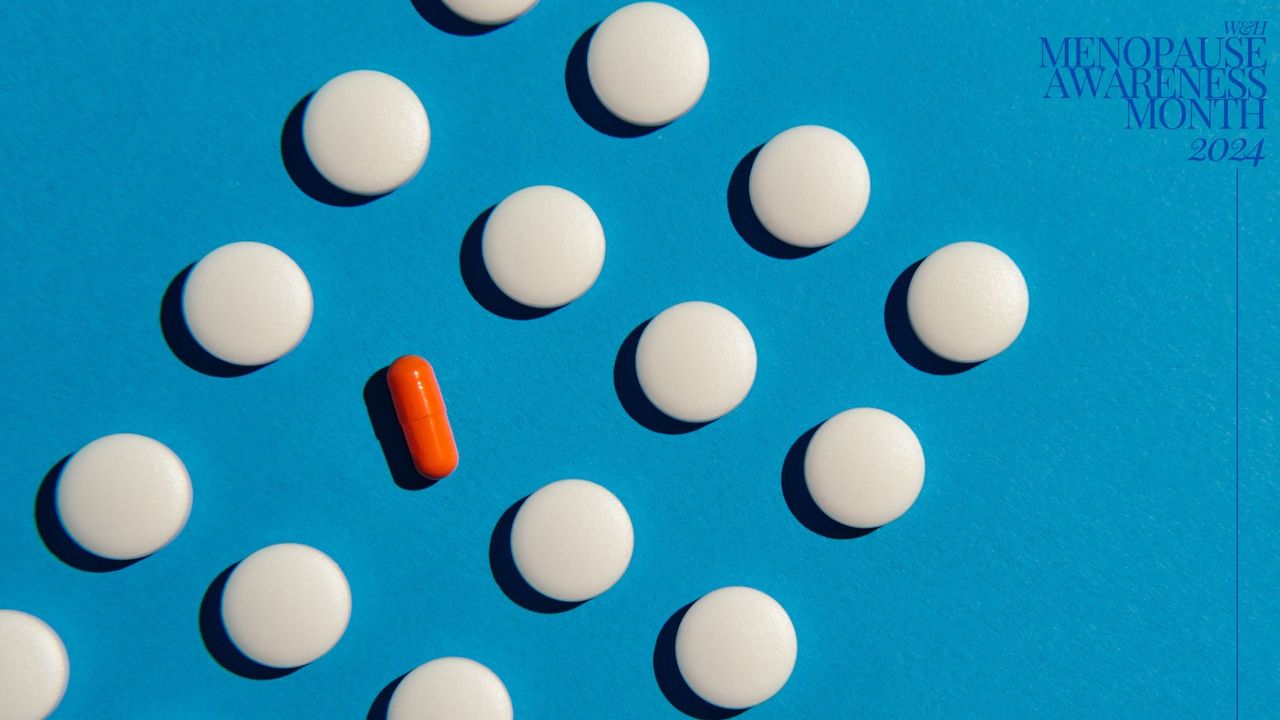I'm using hormonal contraception - how do I know if I'm going through perimenopause? Doctors reveal
Using hormonal contraception in perimenopause can mask the symptoms. Here, doctors reveal how it happens, risks, benefits, and everything else you need to know

Many women find the symptoms of perimenopause hard to ignore - sleepless nights, hot flushes, mood swings, to name a few. But others, those using some type of hormonal contraception, may not notice it's happening at all.
While fertility obviously starts to decrease around the same time many women will start to experience perimenopause symptoms, many sexually active women in their 40s still use a form of contraception to prevent pregnancy and manage their hormones. According to data from the UK Office for Health Improvement and Disparities, 32% of women over 45 were using long-lasting reversible contraception such as the IUD, injection, or implant as their main form of contraception last year. This means many women will be perimenopausal while also on birth control.
This can be a help - alleviating potentially uncomfortable symptoms - but it can also mask them and be a hindrance to those wondering what perimenopause feels like and potentailly looking to make changes to their medical care and health habits during this time.
How hormonal contraception in perimenopause masks symptoms
There are a number of different types of hormonal contraception available to us in the UK. Some contain both oestrogen and progesterone, such as the combined pill, while others contain just progesterone, such as the mini-pill or Mirena coil.
Some of us may have been taking hormonal contraceptives for many years to avoid pregnancy, while others may decide to start using it to manage hormonal fluctuations and prevent heavy periods after 40, which are common and linked to perimenopause.
"Contraception in perimenopause can reduce symptoms like hot flushes, night sweats, mood swings, and irregular bleeding that often comes with perimenopause," says Dr Deepali Misra-Sharp, a GP and advanced menopause specialist, says. It can help the transition but it "can also make it harder to detect the natural onset of menopause as the pill overrides the body's hormonal fluctuations."

Dr Deepali Misra-Sharp is an experienced General Practitioner with over a decade in NHS practice and also serves as the Clinical Lead for Women’s health at her NHS practice based in Birmingham. After graduating from the University of Nottingham’s Medical school in 2010, she earned Fellowship of the Royal College of General Practitioners (FRCGP) for her contributions to General Practice and Women’s Health. She is an Advanced Menopause Specialist and trainer.
No periods
Our periods change in a number of ways in perimenopause - it's often one of the first symptoms people notice. Bleeding becomes more irregular, cycles change in length and flow, and premenstrual syndrome (PMS) symptoms may get worse.
Sign up for the woman&home newsletter
Sign up to our free daily email for the latest royal and entertainment news, interesting opinion, expert advice on styling and beauty trends, and no-nonsense guides to the health and wellness questions you want answered.
When you're on the combined pill, you might still have withdrawal bleeds but it can be "hard to know what's going on from a cycles point of view," says Dr Helen Wall, a fellow GP and women's health specialist. "Other contraceptive methods that just contain progesterone, like the hormone coil and depot injection, can stop regular periods and mask the fact that periods have become less often or are changing."
These factors mean it can be hard to know if you’re still ovulating or not and therefore transitioning towards menopause.

Dr Helen Wall has been a GP partner for over 12 years and has qualifications in sexual health, women’s family planning and menopause.
No menopause symptoms
While not having a period makes perimenopause harder to spot - many women report that hormonal contraception makes for a smoother transition by helping to replace falling hormone levels and manage symptoms.
This is what Bryony Lewis, who is in her 40s, chose to do when she was suffering with what she describes as “debilitating symptoms”. Sadly, she says it was a bit of a battle with her GP to be prescribed something to help with her “very heavy and long periods, brain fog, muscle aches and tiredness”.
“My mum went into early menopause at 40, so it seemed feasible that I could be experiencing perimenopause symptoms. However, the doctors told me that blood tests would be inconclusive or inaccurate and because I wasn't having night sweats, they wouldn't consider a menopause-related diagnosis or HRT.”
She says she feels so much better and her symptoms have improved since she started taking the combined pill. “I am hopeful that this will control my symptoms until my body is fully into menopause, effectively masking the years of perimenopause and the transition,” adds Lewis.
However, the extent to which hormonal contraception in perimenopause will alleviate symptoms depends on the type you're taking, warns Dr Wall. "It's the fall in oestrogen which has the most effect on symptoms such as hot flashes, night sweats and vaginal dryness, so the mini pill [which just contains progesterone] will not mask menopause symptoms as much as the combined pill with both hormones in will.”
If you are interested in taking hormonal contraception to help alleviate symptoms or are having trouble with symptoms, speak to your doctor who will be able to point you towards the best course of treatment.
Can you go through menopause while on the pill?
Yes. “Some women find the pill is helpful to keeping symptoms at bay and need the contraception so prefer to stay on it, which is fine. We know staying on the pill will not delay the menopause," says Dr Wall.
When you start experiencing symptoms and move into menopause will be dependent on your genetics and whether you’ve had any health issues or treatments which have led to early menopause.
I'm on the pill - how do I find out if I'm going through perimenopause?
If you’re unsure, speak to your GP about your symptoms. They will be able to tell you if perimenopause is likely given your age and any other symptoms.
While many of us look to blood tests, these aren't recommended anymore. "While measurement of FSH (follicle stimulating hormone) has often been used in the past to diagnose perimenopause or menopause [in a blood test], the level fluctuates significantly and bears no correlation with severity or duration of symptoms or to requirement for treatment," The British Menopause Society says.
"It's possible to have completely normal blood test results but extreme symptoms, and vice versa," confirms Dr Misra-Sharp. "This is because blood tests are just a snapshot of time and hormone levels vary enormously from person to person.”
The only time a blood test may be useful is if a doctor wants to rule out other conditions such as thyroid problems, or fertility issues in younger women. “As a GP, I would usually focus on symptom management and assessing overall wellbeing rather than relying on hormone levels from blood tests,” says the doctor.
Should I stop taking the pill if I'm going through perimenopause?
Ultimately, that's a conversation to have with your doctor. The answer to this will be dependent on your health situation, symptoms and whether you’re sexually active or not.
As our experts have said above, hormonal contraception in perimenopause can be really helpful in managing perimenopause symptoms and taking contraception of any kind won't stop your body from going through the transition.
However, there are a few things to consider if you are taking the pill in perimenopause and beyond:
- Age and health risks: There are concerns about the risk of cancer, cardiovascular problems and stroke in women in their 40s who take the combined pill. "I often recommend we assess these risks and explore safer alternatives, such as hormone replacement therapy (HRT), which can still offer symptom relief with a more favourable risk profile for older women,” says Dr Misra-Sharp. HRT also comes with its own benefits and risks, however.
- Contraceptive needs: Many women will want to continue to use hormonal contraception in perimenopause because it’s still possible to get pregnant in perimenopause even though your fertility will be declining. Options for progesterone-only contraception include the aforementioned Mirena coil and mini-pill.
- Would HRT be a better alternative? If you’re using hormonal contraception to manage your perimenopause symptoms and you’re approaching 50, it may be worth considering HRT. Dr Misra-Sharp says it “offers symptom relief with lower doses of hormones specifically designed for menopause” and has a different risk profile.
If you have any questions about whether hormonal contraception or HRT is the right path for you, speak to you GP who will be able to give you up-to-date advice. This article is not intended as medical advice.

Kat Storr has been a digital journalist for over 15 years after starting her career at Sky News, where she covered everything from world events to royal babies and celebrity deaths. After going freelance eight years ago, she now focuses on women's health and fitness content, writing across a range of UK publications.
From perimenopause to the latest fitness trends, Kat loves researching and writing about it all. She's happy to give any fitness challenge a go and speaks to experts about wellbeing issues affecting people every day.
-
 What is pink mould and how can you get rid of it safely? Experts share advice
What is pink mould and how can you get rid of it safely? Experts share adviceWhile you may not have even heard of pink mould, it's relatively common and important to know how to tackle it quickly
By Emily Smith Published
-
 The White Company's Hypoallergenic Mattress Topper is surprisingly affordable and a dream to sleep on
The White Company's Hypoallergenic Mattress Topper is surprisingly affordable and a dream to sleep onThe The White Company Hypoallergenic Comfort Topper offers a gentle, supportive layer to your sleep set-up for a surprisingly affordable price.
By Laura Honey Published
